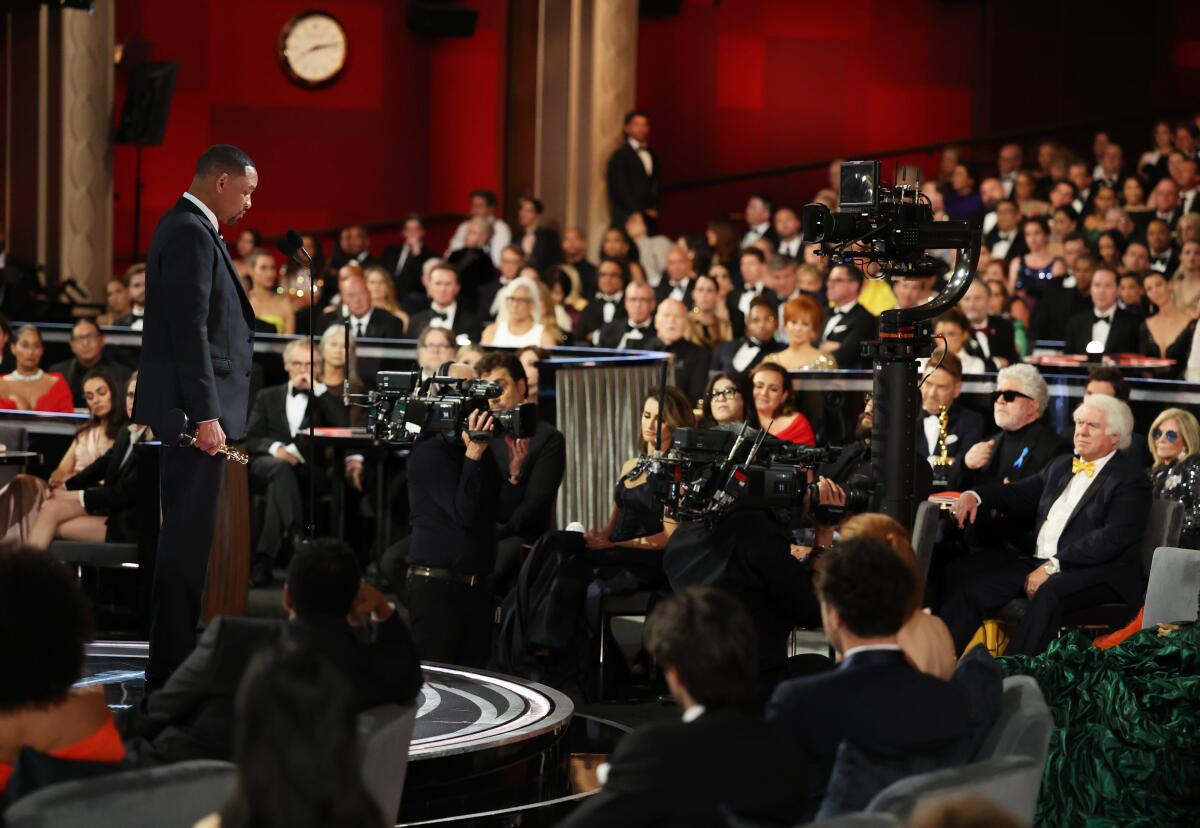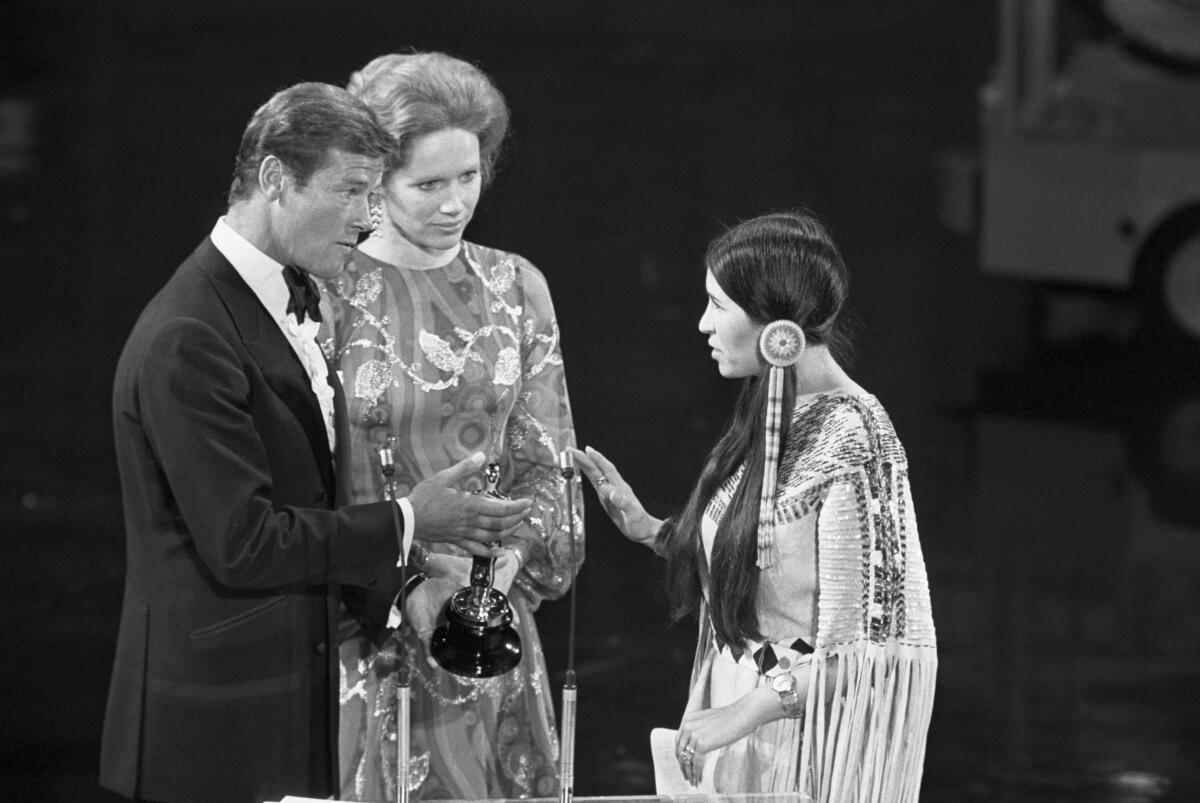Greatest performance, ‘Tár’ none

- Share via
Some things are open for debate. Shohei Ohtani or Aaron Judge? “Let the Right One In” or “Interview With a Vampire?” Hot tub or art installation? (Turns out you need not choose.)
But there’s one thing I believe we can agree on: Butter boards are totally disgusting.
Sign up for The Envelope
Get exclusive awards season news, in-depth interviews and columnist Glenn Whipp’s must-read analysis straight to your inbox.
You may occasionally receive promotional content from the Los Angeles Times.
I’m Glenn Whipp, columnist for the Los Angeles Times, host of the Envelope’s Friday newsletter and the guy who believes that, yes, butter deserves better. And if you invite me over to your house and smear a few sticks of butter on a cutting board that you just used to chop God knows what, know that I will judge you — and not silently.
‘Tár’: Blanchett’s greatest performance?
After wowing festival audiences and critics in Venice and Telluride, Todd Field’s immaculately crafted provocation “Tár” opens in theaters today in a limited release designed to generate (even) more buzz before expanding into more theaters at the end of the month.
Make no mistake: People will be talking about this movie, in which Blanchett plays a renowned classical music conductor possessing such a sheer force of personality that she seems unaware of (or uninterested in) the damage she leaves in her wake. Blanchett is in nearly every scene of this dazzling 158-minute film, which is as uncompromising as its main character.
It’s not for everyone, that’s for sure. Any movie that opens with a full closing credits scroll and then segues into a lengthy on-stage interview between Blanchett’s Lydia Tár and New Yorker writer Adam Gopnik, filling us in on each and every aspect of Lydia’s life, not to mention the history of classical music, seems designed to aggravate. But also ... enthrall. My colleague Justin Chang fell hard for it at Telluride, writing that he didn’t want it to end. I know he has gone back for seconds. I will soon too.

‘Emancipation’ is coming
After Will Smith slapped Chris Rock at the Oscars, which led to the motion picture academy banning the actor from events and programs for 10 years, there was a fair amount of speculation about his upcoming movie, the slavery drama “Emancipation.” Apple TV+ had been slated to release the big-budget film during the 2022 awards season, and many industry observers figured the streamer would punt it until 2023, allowing The Slap to recede a bit more into the mists of time.
Think again: Apple announced this week that “Emancipation” will arrive in theaters on Dec. 2 and land on its streaming service the following week. That decision, sources say, largely came down to Apple execs saying, “Why not now?” given that they had a hole in their calendar when Martin Scorsese decided not to release his $200-million crime drama “Killers of the Flower Moon” this year. (Some believe Scorsese delayed “Flower Moon” to clear the awards season deck for longtime friend Steven Spielberg and his upcoming film, “The Fabelmans.”)
Smith can’t attend the Oscars, though that doesn’t mean he can’t be nominated for one. But it’s likely a little soon to forgive and forget. (“He could give a performance like Brando in ‘The Godfather,’” one academy member told me recently, “and I still wouldn’t vote for him after what he did.”)
The bigger issue for Apple is that “Emancipation” director Antoine Fuqua has what could be charitably called a “checkered” track record, albeit with a handful of champions among critics. And he did direct Denzel Washington to an Oscar-winning performance in “Training Day.” So let’s keep an open mind.

Enjoying this newsletter? Consider subscribing to the Los Angeles Times
Your support helps us deliver the news that matters most. Become a subscriber.
Sacheen Littlefeather, activist who refused Brando’s Oscar, dies at 75
In one of the most famous moments in Oscar history, Sacheen Littlefeather took the stage at the Dorothy Chandler Pavilion on March 27, 1973, after Marlon Brando’s name was read as the winner for the lead actor Oscar. Wearing a fringed buckskin dress and moccasins, Littlefeather refused to take the trophy proffered by presenter Roger Moore.
Littlefeather, then 26, firmly offered Brando’s regrets, explaining that he would not accept the Oscar because of Hollywood’s mistreatment of Native Americans and the ongoing standoff between Oglala Lakota and American Indian Movement activists and federal officials at Wounded Knee, the site in South Dakota of an 1890 massacre of Lakota by the U.S. Army.
“I beg at this time that I have not intruded upon this evening and that we will in the future, our hearts and our understandings will meet with love and generosity,” Littlefeather said.
As Littlefeather spoke, the audience reacted with a confused mix of cheers and boos. In an interview with the academy this year, Littlefeather recalled spotting actor John Wayne being restrained by security guards from rushing the stage.
The details surrounding Wayne’s disapproval have evolved over the years — and have been debunked in recent times. What’s undisputed is that the notoriety of that Oscar appearance stayed with Littlefeather for the rest of her life. She died Sunday of breast cancer, two weeks after the film academy honored her at an event that featured her in conversation with producer and academy member Bird Runningwater, co-chair of the organization’s Indigenous Alliance. The academy officially apologized to Littlefeather in June.
“I am here accepting this apology not only for me alone, but as an acknowledgment, knowing that it was not only for me but for all of our Nations, who all so need to hear and deserve this apology,” Littlefeather said. “Please, when I am gone, always be reminded that whenever you stand for your truth, you will be keeping my voice and the voices of our Nations and our people alive.”

Feedback?
I’d love to hear from you. Email me at glenn.whipp@latimes.com.
Can’t get enough about awards season? Follow me at @glennwhipp on Twitter.
Sign up for The Envelope
Get exclusive awards season news, in-depth interviews and columnist Glenn Whipp’s must-read analysis straight to your inbox.
You may occasionally receive promotional content from the Los Angeles Times.




